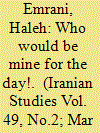| Srl | Item |
| 1 |
ID:
142156


|
|
|
|
|
| Summary/Abstract |
In Turkish political circles, there is a popular quip: “The United States wanted Turkey and Iraq's Kurds to become friends, not get married.”1 As their cooperation deepens, especially in hydrocarbons, observers increasingly question whether the relationship will endure. A solid strategic relationship is born of shared national interests, mutual respect and real interdependence. Fleeting cooperation, in contrast, stems from a temporary confluence of political interests, typically dependent on the personalities and preferences of leaders who may fall from power in the foreseeable future. Such cooperation can fulfill pressing needs, but both parties know the arrangement will be discarded in short order.
|
|
|
|
|
|
|
|
|
|
|
|
|
|
|
|
| 2 |
ID:
144714


|
|
|
|
|
| Summary/Abstract |
Zoroastrians of Babylonia had long lived alongside an important Jewish community whose presence in the region can be traced back to the Achaemenid period (c. 550‒330 BCE). Such long coexistence should justify an interest in the examination of cultural sharing between these two religious groups of Ērānšahr; however, it is just recently that the question of the level of cultural contact between them has become a more important source of inquiry and research by scholars of Iranian history, religious studies and Late Antiquity. The exchanges between the Jews and Zoroastrians of the Sasanian period and their impact on the character of the Babylonian Talmud have been the subject of a number of recent studies, notably by Shaul Shaked, Yaakov Elman, Geoffrey Herman and Shai Segunda, among others. The aim of this article is to contribute to these efforts by exploring the roots of some distinctly Sasanian marriage customs that transcended religious lines and were shared by the rabbinic Jews and Zoroastrians of Ērānšahr.
|
|
|
|
|
|
|
|
|
|
|
|
|
|
|
|